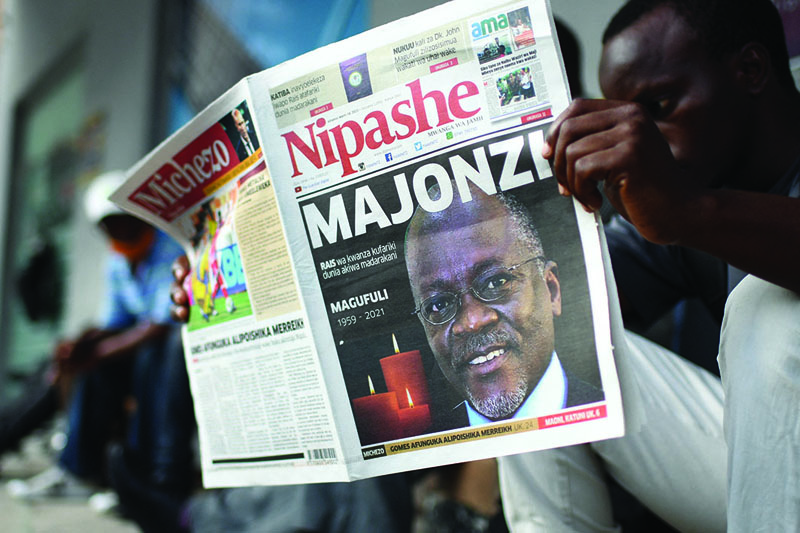 DAR ES SALAAM: A resident of Kariakoo reads the Nipashe newspaper with a headline "Majonzi"-grief, announcing the death of Tanzanian President John Pombe Magufuli, in Dar Es Salaam, yesterday. - AFP
DAR ES SALAAM: A resident of Kariakoo reads the Nipashe newspaper with a headline "Majonzi"-grief, announcing the death of Tanzanian President John Pombe Magufuli, in Dar Es Salaam, yesterday. - AFPDAR ES SALAAM, Tanzania: Tanzania was plunged into mourning yesterday over the death of President John Magufuli following weeks of uncertainty over his health, with his swing to authoritarianism leaving a divided legacy. Flags flew at half-mast as the country began a 14-day mourning period after Vice-President Samia Suluhu Hassan-who is set to become the country's first female leader-announced Magufuli's death shortly before midnight. Hassan said Magufuli had died on Wednesday of a "heart condition" relating to an abnormal heartbeat that he had long suffered from, in a hospital in Dar es Salaam.
The announcement came after government denials the president was ill as pressure mounted to explain his almost three-week absence from public view, which sparked panic and rumors he was seeking treatment abroad for COVID-19. Several people were arrested this week for spreading rumors over his ill-health on social media. As condolences poured in from abroad, main opposition leader Tundu Lissu, shot 16 times in a 2017 assassination attempt and exiled in Belgium, described Magufuli's death as "poetic justice", insisting his sources said he had succumbed to COVID-19.
"Magufuli died of corona. That is one. Number two, Magufuli did not die this evening. I have information from basically the same sources which told me he was gravely ill, I have information that Magufuli has been dead since Wednesday of last week," he told Kenya's KTN News, using local slang for the virus. "What should I say? It is poetic justice. President Magufuli defied the world on the struggle against corona... He defied science... And what has happened, happened. He went down with corona."
Kenyan President Uhuru Kenyatta, current head of the East African Community bloc, said Africa had lost an "illustrious" leader and ordered a seven-day period of mourning in Kenya and for flags to fly at half-mast in the region. Ethiopia, Britain and the United States also sent condolences, with Washington saying "we hope that Tanzania can move forward on a democratic and prosperous path."
'I am shocked'
Magufuli was first elected in 2015 as a corruption-busting man of the people, endearing him to a population weary of graft scandals, who loved his no-nonsense attitude. His expansion of free education, rural electrification and infrastructure investments also won him support, as did his efforts to increase Tanzania's stake in mineral resources, demanding millions in back taxes from foreign mining companies. "The poor had started making progress, business was flourishing, if you had a problem, the president would hear you out," said 71-year-old newspaper vendor Kondo Nyumba, crying, as he sold the day's papers, one of which had 'Sorrow' headlining the front page.
Another city resident Omar Jongo, 42, was still in shock. "As any other Tanzanian, I am shocked, and we still haven't come to terms with the news," he told AFP. "For the short time he served, he has done major visible reforms, as a nation we will remember him for the many good things he has done. However, Magufuli's slide into authoritarianism, which saw a crackdown on the media, civil society and opposition, raised alarm among foreign allies and rights groups.
His re-election last October was dismissed by the opposition and some diplomats as a sham, over alleged rigging, the blocking of foreign media and observer teams and an oppressive military presence. "He will be remembered far more for what he destroyed (civic space, media freedom, democratic institutions, good governance) than for anything he started building (roads, modern railway, bridges, power plants, new planes and more)," said Dr Thabit Jacob, a researcher at the Roskilde University in Denmark and expert on Tanzania, in a text message. "Some will argue he had good intentions and had the country at heart, but he leaves us with a complicated legacy to discuss for many years."
'There is no COVID-19'
Magufuli was one of a handful of world leaders, alongside former US president Donald Trump and Brazil's Jair Bolsonaro, who scoffed at the virus, championing alternative medicines. He called for prayer instead of face masks, before stopping the publication of statistics in April 2020 when the country had recorded a total of 509 cases and 16 deaths. Tanzania became an outlier in a region which quickly implemented lockdowns, night-time curfews and travel restrictions to stem infections. In May last year he revealed he had submitted a variety of fruit and animals to be tested for the virus and that a papaya, quail and goat tested positive, proving "sabotage" at the national laboratory.
Magufuli later claimed prayer had saved the country from COVID-19. "That's why we are all not wearing face masks here. You think we don't fear dying? It's because there is no COVID-19," he said. However by February, as illness soared and the vice president of semi-autonomous Zanzibar was revealed to have died from COVID-19, Magufuli conceded the virus did in fact exist. Nevertheless he warned his health ministry not to rush into procuring vaccines, saying they were "dangerous".
Under Tanzania's constitution, Hassan will become the country's first female president and will consult the ruling Chama Cha Mapinduzi (CCM) party over the appointing of a new vice president. Jacob said she would be a "president with a much weaker base, who will be controlled by the Magufuli faction and the intelligence. She will struggle to build her own base and factional contestations will emerge." - AFP











